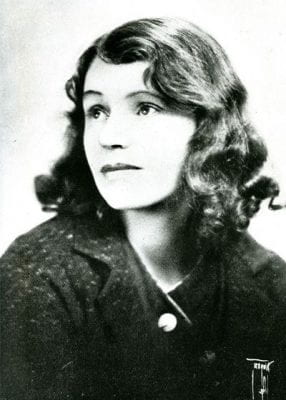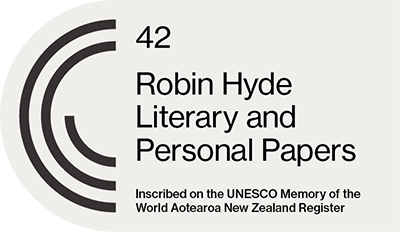Te Tumu Herenga is excited to announce that the papers of New Zealand poet, novelist, journalist and biographer Robin Hyde, held by Special Collections, and the Alexander Turnbull Library, Wellington, have been inscribed on UNESCO’s New Zealand Memory of the World Register.
The joint submission made by Special Collections and the Turnbull was one of five successful 2020 nominations.1 The inscription recognises Robin Hyde’s contribution to New Zealand literature, her place as one of New Zealand’s great writers and the richness and research value of her papers. Robin Hyde was the pseudonym of Iris Guiver Wilkinson (1906-1939).

Robin Hyde, October 1934 2
The Register is part of the New Zealand Memory of the World (MOW) Programme. It’s one of over 60 UNESCO MOW programmes worldwide which seek to identify significant items of documentary heritage and raise public awareness of their value and the work of the institutions which care for them. Other inscriptions on the New Zealand Register include Te Tiriti o Waitangi, the Women’s Suffrage Petition and the papers of Katherine Mansfield, Charles Brasch and John A. Lee.
Donated to Te Tumu Herenga in the early 1960s, the Hyde papers in Special Collections include handwritten or typescript drafts of some 600 of her poems and typescripts for her prose works Journalese, Check to your king, Passport to hell, and Wednesday’s children. Special Collections also holds several first editions of Hyde’s published prose and poetry collections, many of which carry her inscriptions to friends. The Alexander Turnbull Library’s holdings include Hyde’s notebooks and journals, photo albums, and correspondence with friends and family. Auckland Libraries also holds examples of Hyde’s correspondence and her autobiographical writing.
Hyde’s literary papers have been used extensively by students and academics. Professor Michele Leggott’s in-depth analysis of Hyde’s poetry resulted in the publication of her previously unpublished long prose poem, The Book of Nadath in 1999, and Young knowledge: the poems of Robin Hyde in 2003.
In conversation
Exhibition curator Katherine Pawley and Professor Michele Leggott discuss the importance of the Robin Hyde collection, the Memory of the World inscription and the exhibition. Listen to their conversation.
Part One: An interest spanning many years
Part Two: The New Zealand Memory of the World Register
Part Three: Robin Hyde’s influences
The full interview is also available through Manuscripts and Archives.
‘torrents of amber’ exhibition and talk
Special Collections marked the Memory of the World recognition with the exhibition ‘torrents of amber’, the extraordinary work of Robin Hyde, held from February to March 2021. Through selected papers and published works, the exhibition explored the extraordinary volume, range, and originality of Robin Hyde’s work and her place in the 1930s Auckland literary scene. The exhibition title came from the poem ‘Rain in the night’, which Hyde wrote in late 1933 or early 1934 and published in her third collection of poems, Persephone in winter.
Discover more
- Explore Special Collections holdings of Robin Hyde’s papers
- View the online version of the ‘Torrents of amber’ exhibition
- Find out more about the life and work of Robin Hyde:
- View the UNESCO Memory of the World New Zealand inscription
- Read the UniNews article ‘UNESCO honour for writer Robyn Hyde’
- Read the University of Auckland press release ‘Writer’s work recognised by UNESCO’
Katherine Pawley, Special Collections
References
Featured image: Detail from the handwritten manuscript for ‘Rain in the Night’. Robin Hyde literary papers. MSS-Archives-97/1, item 484/1
1 Five successful 2020 nominations added to the New Zealand Memory of the World Register
2 Photograph of Robin Hyde taken in October 1934. Robin Hyde typescript of ‘Wednesday’s children’. MSS & Archives B-15, folder 2


